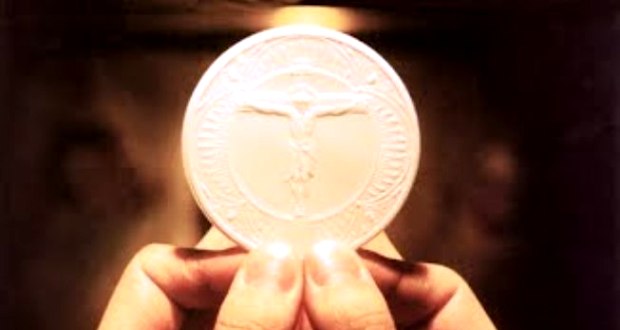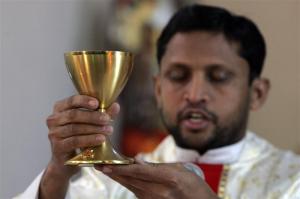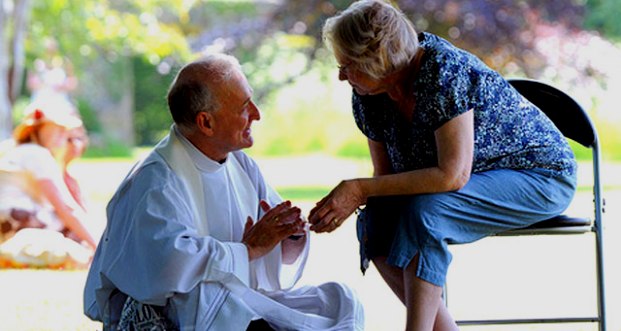Eucharist – Body Of Christ

Holy Mass And The Eucharist – What Catholics Believe
Today, I went to midday Mass as I try to do most Fridays and it was great as always. I suppose for a non-believer or a passive participant; they may not quite know what I am talking about, but that’s a different story for a different series of writings. Apart from it being still the Easter season and still being overcome with utter amazement (amazement is not quite the word, but it will have to do for now) that not only did God – the Creator of all that was, all that is and all that will be – not only did He come into our world, but then at the appointed time, He freely laid down His life for my sake and yours, so that we may have life – life abundantly! Now I am not sure if the magnitude of this reality has made a home run in your life, but it is way beyond awesome to be love to such an extent – not by our mothers or fathers or spouses – but by God Himself! …. And not only to be loved by Him, but to celebrate His – and be given the opportunity to experience this love over and over again at Holy Mass, is indeed a great privilege and an unspeakable joy!
[simpleazon-image align=”left” asin=”1574551094″ locale=”us” height=”475″ src=”http://ecx.images-amazon.com/images/I/41CB0DMXW8L.jpg” width=”323″]Most of the mid-day Masses that I attend are said by an ‘oldish’ priest, who walks from his presbytery in Port of Spain Trinidad, to say Mass. Now that is at least a ten minute walk, in the hot blazing ‘Trini’ mid-day sun; end every time He enters the church with his bag on his shoulder, he would always be filled with zeal as he reverence the alter. He never seems to be too tired from the heat of the sun to totally enter into the celebration of the Holy Mass as he pours himself out. So I always leave there renewed and revived.
Today, apart from the great teaching and preaching of the priest, I had another experience at Holy Mass that gladdened my heart. I happened to be sitting right next to one of the Holy Communion distribution points and one of the Eucharistic ministers stationed there, was a former teacher at the secondary school I attended a number of years ago. He had long retired from the teaching service. When he is distributing Holy Communion, being fully aware of what he is doing – sharing the Body and Blood of Jesus Christ, he does all in his power to help you to recognize Jesus in the ‘breaking of bread.’ He would hold up the Eucharist and proclaim, “Body of Christ!” and would wait for a response. On two occasions today, he did not get a response, so he repeated with all the more zeal, “Body of Christ!” In both instances, there was still no response. So he asked the person in front of him, “Are you Catholic?” I suppose they responded no because in both instances, he gently indicated to them that they could not receive the Holy Eucharist. At the end of Holy Mass, the Eucharistic Minister hastened to the back of the church to meet the two persons and to explain to them why he could not give them the Holy Eucharist. I thought to myself, “WOW!”
Now why did this touch me? Well I have seen on many occasions – and I’m sure you have too – the Holy Eucharist being distributed like a deck of cards at an all-fours or poker game. I have seem and I am sure you have too, on several occasions, a lack-lustre approach to the distribution and the receiving of Holy Eucharist, where the response of the recipient seemed irrelevant. Now much can be shared about this, but I will be sharing more in future posts. Here I would just like to re-iterate what the Catholic Church teaches and what Catholics should believe about the Holy Eucharist. Before I share with you what the Catechism of the Catholic Church teaches, I’d like to share with you an eye-opening experience I had in the late 1990’s.
I was birthed into the Catholic Church. I was baptised a Catholic, made First Communion, was Confirmed, did Life in the Spirit seminars, and several other retreats. I attended Holy Mass every week-end. Yet, the reality that Jesus is present, Body, Blood, Soul and Divinity seemed to elude me most times. I would have been one with a lack-lustre response to “Body of Christ.” In 1996 – I believe – Youth 2000 was introduced into Trinidad and I attended as part of the music ministry. This retreat is a very beautiful one centered around the Holy Eucharist – literally speaking. There is a part of the retreat that focuses on healing, where the priest would carry the Holy Eucharist in a Monstrance to all the participants. I had not experienced any thing like this before. There were screams as evil was driven away. Many were delivered from the power of evil. It was then that I had my Eucharistic home run; when the reality of it all really hit home, and like Thomas, I exclaimed, “My Lord and my God!”
When we say AMEN, we are saying, “Lord, I believe! Let it be so!” So when the priest or the Minister of the Eucharist says, “Body of Christ,” and you respond, “Amen,” you are saying yes, I believe. This is what the Holy Roman Catholic Church teaches about the Holy Eucharist and what you are saying yes I believe to:-
The Eucharist in the Economy of Salvation
The signs of bread and wine
[simpleazon-image align=”right” asin=”030759081X” locale=”us” height=”500″ src=”http://ecx.images-amazon.com/images/I/51k4XZbbctL.jpg” width=”333″]1333 At the heart of the Eucharistic celebration are the bread and wine that, by the words of Christ and the invocation of the Holy Spirit, become Christ’s Body and Blood. Faithful to the Lord’s command the Church continues to do, in his memory and until his glorious return, what he did on the eve of his Passion: “He took bread….” “He took the cup filled with wine….” the signs of bread and wine become, in a way surpassing understanding, the Body and Blood of Christ; they continue also to signify the goodness of creation. Thus in the Offertory we give thanks to the Creator for bread and wine,152 fruit of the “work of human hands,” but above all as “fruit of the earth” and “of the vine” – gifts of the Creator. the Church sees in the gesture of the king-priest Melchizedek, who “brought out bread and wine,” a prefiguring of her own offering.153
1334 In the Old Covenant bread and wine were offered in sacrifice among the first fruits of the earth as a sign of grateful acknowledgment to the Creator. But they also received a new significance in the context of the Exodus: the unleavened bread that Israel eats every year at Passover commemorates the haste of the departure that liberated them from Egypt; the remembrance of the manna in the desert will always recall to Israel that it lives by the bread of the Word of God;154 their daily bread is the fruit of the promised land, the pledge of God’s faithfulness to his promises.
The “cup of blessing”155 at the end of the Jewish Passover meal adds to the festive joy of wine an eschatological dimension: the messianic expectation of the rebuilding of Jerusalem. When Jesus instituted the Eucharist, he gave a new and definitive meaning to the blessing of the bread and the cup.
1335 The miracles of the multiplication of the loaves, when the Lord says the blessing, breaks and distributes the loaves through his disciples to feed the multitude, prefigure the superabundance of this unique bread of his Eucharist.156 The sign of water turned into wine at Cana already announces the Hour of Jesus’ glorification. It makes manifest the fulfillment of the wedding feast in the Father’s kingdom, where the faithful will drink the new wine that has become the Blood of Christ.157
1336 The first announcement of the Eucharist divided the disciples, just as the announcement of the Passion scandalized them: “This is a hard saying; who can listen to it?”158 The Eucharist and the Cross are stumbling blocks. It is the same mystery and it never ceases to be an occasion of division. “Will you also go away?”:159 The Lord’s question echoes through the ages, as a loving invitation to discover that only he has “the words of eternal life”160 and that to receive in faith the gift of his Eucharist is to receive the Lord himself.
The institution of the Eucharist
1337 The Lord, having loved those who were his own, loved them to the end. Knowing that the hour had come to leave this world and return to the Father, in the course of a meal he washed their feet and gave them the commandment of love.161 In order to leave them a pledge of this love, in order never to depart from his own and to make them sharers in his Passover, he instituted the Eucharist as the memorial of his death and Resurrection, and commanded his apostles to celebrate it until his return; “thereby he constituted them priests of the New Testament.”162
1338 The three synoptic Gospels and St. Paul have handed on to us the account of the institution of the Eucharist; St. John, for his part, reports the words of Jesus in the synagogue of Capernaum that prepare for the institution of the Eucharist: Christ calls himself the bread of life, come down from heaven.163
1339 Jesus chose the time of Passover to fulfill what he had announced at Capernaum: giving his disciples his Body and his Blood:
Then came the day of Unleavened Bread, on which the passover lamb had to be sacrificed. So Jesus sent Peter and John, saying, “Go and prepare the passover meal for us, that we may eat it….” They went … and prepared the passover. and when the hour came, he sat at table, and the apostles with him. and he said to them, “I have earnestly desired to eat this passover with you before I suffer; for I tell you I shall not eat it again until it is fulfilled in the kingdom of God.”…. and he took bread, and when he had given thanks he broke it and gave it to them, saying, “This is my body which is given for you. Do this in remembrance of me.” and likewise the cup after supper, saying, “This cup which is poured out for you is the New Covenant in my blood.”164
1340 By celebrating the Last Supper with his apostles in the course of the Passover meal, Jesus gave the Jewish Passover its definitive meaning. Jesus’ passing over to his father by his death and Resurrection, the new Passover, is anticipated in the Supper and celebrated in the Eucharist, which fulfills the Jewish Passover and anticipates the final Passover of the Church in the glory of the kingdom.
“Do this in memory of me”
1341 The command of Jesus to repeat his actions and words “until he comes” does not only ask us to remember Jesus and what he did. It is directed at the liturgical celebration, by the apostles and their successors, of the memorial of Christ, of his life, of his death, of his Resurrection, and of his intercession in the presence of the Father.165
1342 From the beginning the Church has been faithful to the Lord’s command. of the Church of Jerusalem it is written:
They devoted themselves to the apostles’ teaching and fellowship, to the breaking of bread and the prayers…. Day by day, attending the temple together and breaking bread in their homes, they partook of food with glad and generous hearts.166
1343 It was above all on “the first day of the week,” Sunday, the day of Jesus’ resurrection, that the Christians met “to break bread.”167 From that time on down to our own day the celebration of the Eucharist has been continued so that today we encounter it everywhere in the Church with the same fundamental structure. It remains the center of the Church’s life.
1344 Thus from celebration to celebration, as they proclaim the Paschal mystery of Jesus “until he comes,” the pilgrim People of God advances, “following the narrow way of the cross,”168 toward the heavenly banquet, when all the elect will be seated at the table of the kingdom.
Conclusion
So when we attend Holy Mass, Jesus is present; Body, Blood, Soul and Divinity, in the form of the Holy Eucharist, and when we say “Amen” to “Body of Christ”, we are saying “Yes Lord, I believe it is really you I am receiving. Consume me with your love as I am being allowed to consume you.” We should always be conscious of this when ever we receive the Holy Eucharist. There is a tremendous grace that is poured out on us whenever we worthily receive the Holy Eucharist; when ever we “eat of the Lord and we drink of the Lord” and this grace transforms us and allows us to become more like Him.





Indeed, the great mystery and amazing grace of the Eucharist is the being of Christ Himself…both body and blood…truly present each Mass we attend…once the priest consecrates the host…it’s no longer a mere wafer but becomes the divinity of our Lord Jesus Christ. He is truly present every Mass as we partake His body and blood to be in communion with Him and become united with Him.
Truly the Holy Eucharist the daily miracle which is so precious to miss.. of God’s love for us truly made present to us.. for God so loved the world, that He gave us only His Son… to redeem all of us!
God’s blessings and peace!
Christie Gregor
Say It With God’sWord